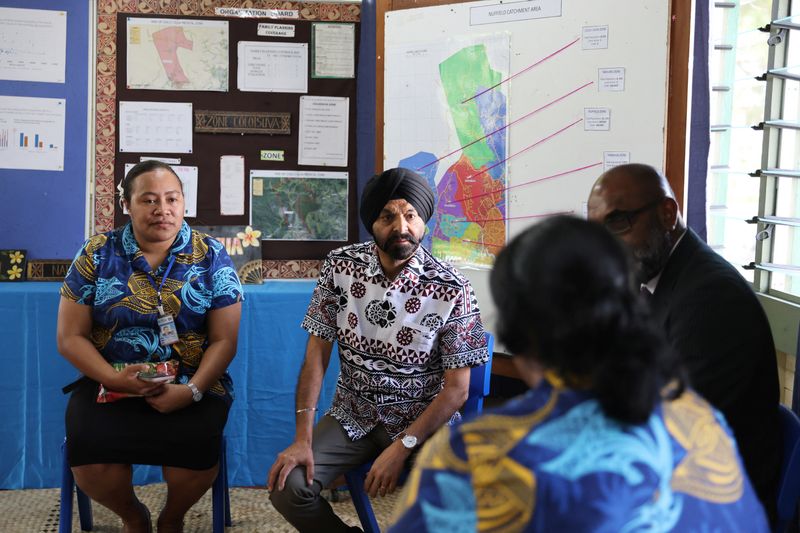Exclusive-World Bank President in Tuvalu says youth skills key to climate change plan
2024.09.06 11:28
By Kirsty Needham
FUNAFUTI, Tuvalu (Reuters) – World Bank President Ajay Banga said on Friday that young people in the Pacific Island nation of Tuvalu need training to help them move and adapt to climate change as he visited the frontline of the battle against rising sea levels.
On the first visit by a World Bank chief to Tuvalu – where 11,00 people live on 26 square km (10 square miles) of land stretched across nine atolls – the impact of the changes was clear, he said, as the tiny nation fortified its ports and reclaimed coastal land.
Soon after taking on the top job in June last year, Banga expanded the global lender’s remit for the first time in 80 years to encompass climate change, under the banner of alleviating poverty in a liveable planet.
Scientists say by 2050, half of Tuvalu’s main town of Funafuti will be inundated by tides. A climate migration deal struck with Australia last year gives its population a pathway to move when its atolls become uninhabitable.
Banga spoke to young people who said they told him leaving their home was the “Plan B”.
The World Bank’s vision for a liveable planet was wider than physical infrastructure, he said in an interview with Reuters.
“It is also about human infrastructure,” he said.
“Why should they not have education and health care when they are growing up? It’s not just a question of survival. It’s a question of quality of life.”
Banga said he wanted the World Bank to move faster, focus on impact, share its knowledge with the Pacific islands and create jobs for young people.
In Tuvalu, this could mean investing in skills institutes to give young people who face migrating to another country training as a nurse or plumber, he said.
Nivaga Talua, vice president of the Tuvalu National Youth Council, said he discussed with Banga the skills a climate migrant might need.
“That skill would have been maintained in Tuvalu and first used for the benefit of our people,” he said.
Since taking on the role just over a year ago, Banga has visited every region where the World Bank operates. The Pacific Islands nation of Tuvalu, population 11,000, is the last stop.
The World Bank said in December it will deploy 45% of its annual financing to climate change adaptation and mitigation by 2025. In the Pacific Islands, that goal has already been reached, he said.
Banga will use the platform of the United Nations General Assembly in New York this month to highlight reforms to the World Bank and urge rich nations to replenish funds to its International Development Association (IDA), which supports the poorest nations, including many in the Pacific Islands.
Tuvalu’s Deputy Prime Minister, Panapasi Nelesoni, said on Friday that water inundation from sea level rise makes it harder to grow vegetables for food, compounding health problems.
“The IDA fund is very important because it is grants given to us. Right now it is difficult for us to borrow money and we like to see a continuation of that assistance from rich countries, given the problem we have with climate change,” he said.
STAY OR GO?
Grace Malie, 25, one of the young people who spoke with Banga, said she learnt about climate change at the age of eight as her parents explained why the space for playgrounds was shrinking.
She wants support for Tuvalu to adapt for as long as it can. “I love my country, I love my home and I love doing what I do every day in Tuvalu and I wish to stay,” she said.

In the streets of Funafuti, IT worker Maani Maani, 32, said his generation faced a difficult decision. While someone with his skills can get visas to work in places like Australia, he worried about the older people left behind.
“Our mainland is getting thinner and thinner. Crops can’t grow well. I think God is not going to save us this time,” he said.








